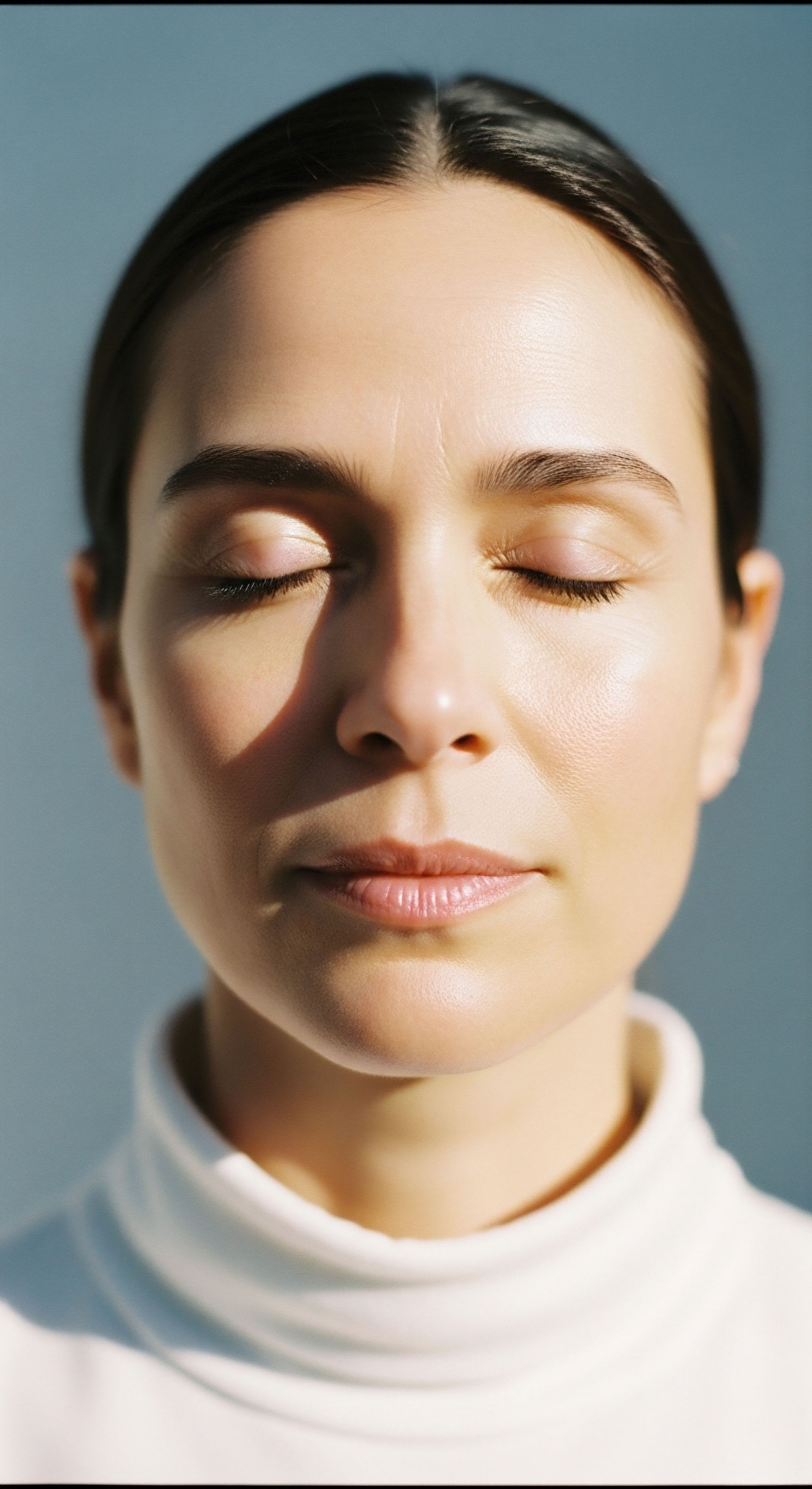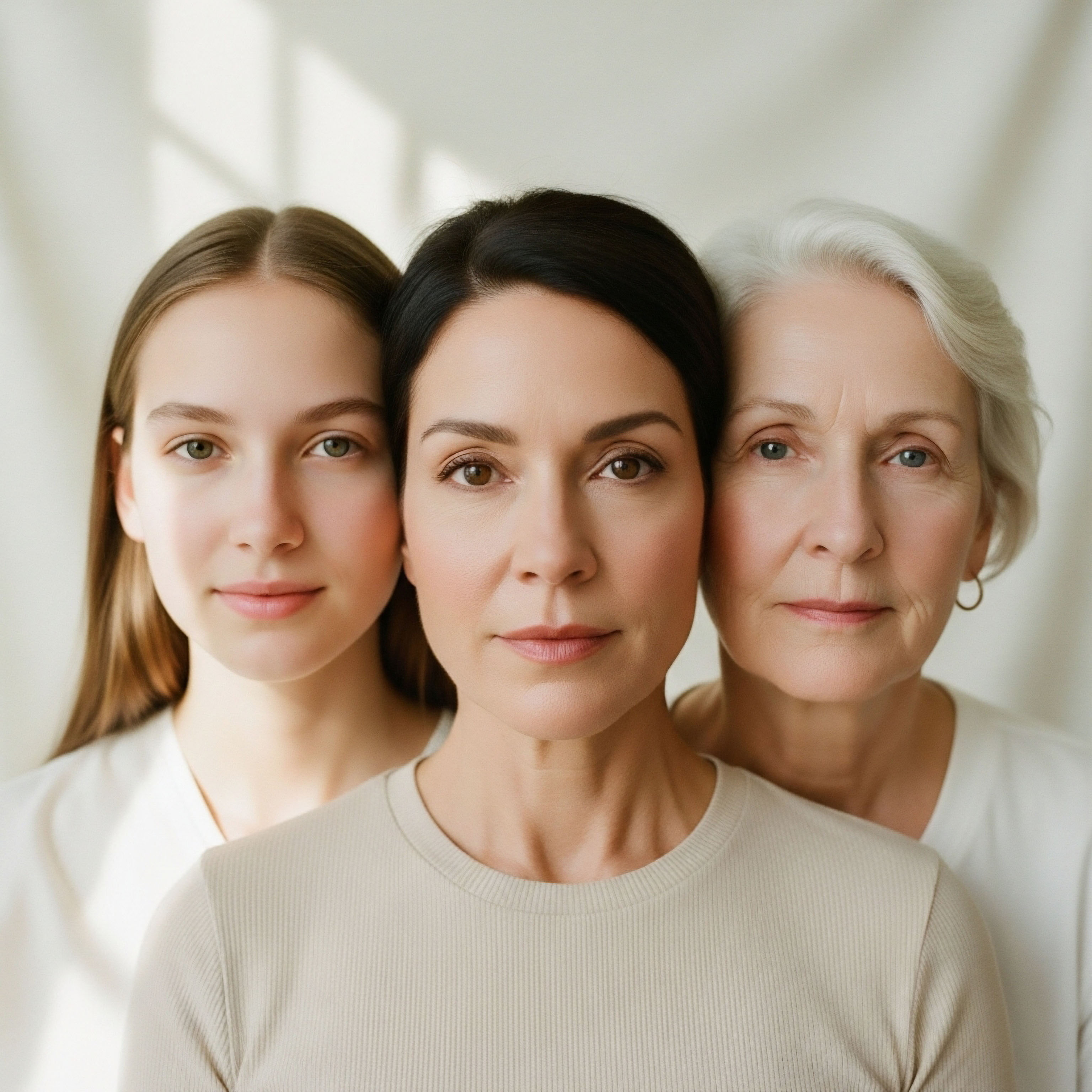

Fundamentals
Your body operates on a precise, internal timetable, a rhythm dictated by the complex interplay of hormones. This endocrine clock governs growth, metabolism, and, critically, the window of fertility. You may feel a growing dissonance between this biological cadence and the timeline of your own life, a sense that your personal, professional, and reproductive goals are not perfectly aligned with your physiology.
This feeling is a valid and increasingly common human experience. Fertility preservation is a clinical tool developed to address this very dissonance. It is a direct application of medical science designed to create congruence between your biological capacity and your life’s design, offering a measure of autonomy over a deeply personal timeline.
The decision to pursue fertility preservation originates from a place of profound self-awareness. It is an acknowledgment of the finite nature of reproductive potential and a proactive step toward expanding future possibilities. The process itself is a testament to our growing understanding of human endocrinology.
By utilizing targeted hormonal protocols, we can stimulate and retrieve gametes ∞ oocytes or sperm ∞ at a point of optimal viability. These cells are then held in a state of suspended animation through cryopreservation, effectively pausing their biological clock until you determine the time is right. This intervention allows for a recalibration, a conscious alignment of your reproductive future with the unfolding narrative of your life.
The core purpose of fertility preservation is to grant individuals agency over their reproductive timeline by harmonizing it with their personal life goals.

The Biological Basis for Action
The human reproductive system is a finely tuned apparatus governed by the Hypothalamic-Pituitary-Gonadal (HPG) axis. This intricate communication network regulates the maturation and release of gametes. In women, ovarian reserve, the quantity and quality of oocytes, declines steadily with age. This decline is a natural, programmed process, an unchangeable aspect of female physiology.
For men, while sperm production continues throughout life, factors like age and environmental exposures can degrade sperm quality and genetic integrity. Understanding these biological realities is the first step in making an informed decision. The procedures used in fertility preservation work with these systems, temporarily amplifying their output to secure a repository of healthy cells for later use.

Why Does Ovarian Reserve Diminish?
A woman is born with all the oocytes she will ever have. From birth, this number continuously decreases through a process called atresia. Hormonal signals from the HPG axis recruit a cohort of follicles each month, with one typically becoming dominant and releasing an egg during ovulation.
The remaining follicles in that cohort are lost. As time progresses, the pool of available follicles shrinks, and the genetic quality of the remaining oocytes may decline. This physiological trajectory underpins the urgency many feel.
Fertility preservation techniques, specifically oocyte cryopreservation, intervene by using gonadotropins ∞ hormones that mimic the body’s natural signals ∞ to rescue an entire cohort of follicles that would otherwise be lost in a single cycle. This allows for the banking of multiple oocytes at once, capturing a snapshot of fertility at a specific moment in time.


Intermediate
Advancing from the foundational ‘why’ of fertility preservation, we arrive at the clinical ‘how’. The process is a carefully orchestrated dialogue with the endocrine system, using precise biochemical signals to achieve a specific outcome. The two primary pathways are oocyte cryopreservation for women and sperm cryopreservation for men, with embryo cryopreservation available for couples or individuals using donor gametes.
Each protocol is tailored to the individual’s unique physiology, health status, and personal circumstances, reflecting a commitment to personalized medicine. The ethical considerations begin to surface here, grounded in the principles of informed consent, realistic expectations of success, and equitable access to these advanced technologies.
The most common procedure for women, known as social egg freezing or planned oocyte cryopreservation, involves a period of controlled ovarian hyperstimulation. This is achieved through the administration of exogenous hormones, primarily Follicle-Stimulating Hormone (FSH) and Luteinizing Hormone (LH) analogues.
These are the same signaling molecules your pituitary gland uses to orchestrate a normal menstrual cycle, but they are provided at a higher, therapeutic dosage. This protocol encourages a group of ovarian follicles to mature simultaneously. The process is monitored closely with ultrasound and blood tests to track follicular growth and hormonal levels, ensuring the retrieval is timed for optimal oocyte maturity.
The retrieval itself is a minimally invasive procedure performed under sedation. The harvested oocytes are then vitrified, a flash-freezing technique that prevents the formation of damaging ice crystals, preserving the delicate cellular structures for future use.
Hormonal stimulation protocols for fertility preservation are designed to amplify the body’s natural reproductive signals for a single cycle to maximize gamete retrieval.

Regional Disparities and Access
The availability, cost, and regulation of fertility preservation create a complex global landscape. Ethical questions of justice and equity arise when access to such a significant life-altering technology is determined by geography and socioeconomic status.
In some regions, national health systems may cover the cost of preservation for medical reasons, such as prior to gonadotoxic cancer therapy (oncofertility), but not for elective or social reasons. This distinction creates a contentious ethical boundary. The decision-making process is further complicated by varying cultural norms and legal frameworks governing the storage and use of cryopreserved gametes and embryos.
The table below illustrates how different factors can create distinct ethical climates in hypothetical regions, impacting an individual’s ability to exercise reproductive autonomy.
| Factor | Region A (e.g. Scandinavia/parts of Western Europe) | Region B (e.g. United States) | Region C (e.g. parts of Asia/Latin America) |
|---|---|---|---|
| Public Funding |
Often subsidized for oncofertility; limited or no funding for social preservation. |
Largely private pay; insurance coverage is inconsistent and varies by state and employer. |
Almost exclusively private pay; public resources are focused on primary healthcare. |
| Regulatory Oversight |
Strong national registries, strict laws on storage duration and disposition of embryos. |
Clinic-specific policies guided by professional bodies (e.g. ASRM), with significant state-level legal variation. |
Regulations can be nascent or vary widely, leading to inconsistencies in care and standards. |
| Cultural Influence |
Generally secular approach, with debates centered on distributive justice and resource allocation. |
Diverse cultural and religious views influence public opinion and legislation on embryo status. |
Strong cultural emphasis on traditional family structures can influence the social acceptability of non-traditional paths to parenthood. |

What Is the Principle of Informed Consent in This Context?
Informed consent in fertility preservation extends beyond outlining the medical risks of the procedure. It is an ethical imperative that the individual fully comprehends the statistical probabilities of success, the financial and emotional costs, and the uncertainties involved. Success is not guaranteed.
The probability of a live birth from a cryopreserved oocyte depends heavily on the woman’s age at the time of freezing and the number of oocytes stored. A 32-year-old woman who stores 20 mature oocytes has a significantly higher chance of a future live birth than a 39-year-old woman who stores 10.
Communicating these probabilities without creating false hope or undue despair is a central ethical challenge for clinicians. It requires a transparent discussion of data, acknowledging the limitations of current technology and ensuring the individual’s decision is based on a realistic appraisal of the potential outcomes.


Academic
The discourse on fertility preservation, when examined through an academic lens, shifts to the complex interplay between individual reproductive autonomy and the broader societal structures that shape personal choices. The technology exists as a powerful tool for self-determination. Yet, the decision to use it is rarely made in a vacuum.
It is deeply embedded within regional economic pressures, cultural expectations of gender roles, and the corporate promotion of specific life trajectories. This creates a nuanced ethical field where the concept of a “choice” must be critically evaluated. Is planned oocyte cryopreservation an act of empowerment, or is it a medically complex and expensive response to societal conditions that are inhospitable to women building careers and families concurrently?
This tension gives rise to the principle of “contextualized autonomy.” An individual’s decision-making capacity is analyzed in the context of their environment. In a region with robust support for working parents, including subsidized childcare and generous parental leave, the pressure to delay childbearing and pursue social egg freezing may be substantially lower.
Conversely, in a hyper-competitive corporate culture where career advancement is implicitly tied to uninterrupted work during one’s twenties and thirties, the “choice” to freeze oocytes may feel coercive. The ethical burden, therefore, extends beyond the clinic to policymakers and employers. The availability of a technological solution does not absolve a society from examining the underlying problems that make the solution seem necessary for so many.
The ethical evaluation of fertility preservation must account for the societal pressures that frame the decision, distinguishing true autonomy from a conditioned response.

Justice Beneficence and the Allocation of Resources
From a bioethical standpoint, the principles of justice and beneficence are central to the regional disparities in fertility preservation. Justice, in this context, refers to the fair distribution of benefits, risks, and costs. The high cost of elective fertility preservation in many regions renders it accessible only to a privileged segment of the population, exacerbating existing social and economic inequalities.
This creates a two-tiered system of reproductive possibility, where financial means, rather than medical need or personal desire, become the primary determinant of access. This directly challenges the equitable distribution of healthcare resources.
The principle of beneficence ∞ the obligation to act for the benefit of others ∞ is also tested. While the technology offers a clear benefit to the individual, the allocation of medical talent, laboratory resources, and healthcare funding toward elective procedures for healthy individuals raises questions.
In regions with strained healthcare systems, a rigorous ethical debate must occur regarding the prioritization of resources. How does a society balance the profound personal benefit of fertility preservation for one person against the public health needs of many? The following table deconstructs these core bioethical principles as they apply to different preservation scenarios.
| Principle | Application in Oncofertility | Application in Social Preservation | Regional Ethical Conflict |
|---|---|---|---|
| Autonomy |
The patient’s right to be informed about the risk of iatrogenic infertility and to choose preservation. |
The individual’s right to plan their reproductive future in response to personal and professional goals. |
Regional laws restricting embryo creation or storage may conflict with individual autonomy. |
| Beneficence |
Acting to restore a biological function (fertility) that is being damaged by life-saving medical treatment. |
Acting to provide the psychological and real-world benefit of extending the reproductive window. |
The benefit to the individual must be weighed against the societal cost and allocation of medical resources. |
| Non-maleficence |
Ensuring the preservation procedure does not delay critical cancer treatment or pose undue surgical risk. |
Avoiding the harm of providing false hope, minimizing the risks of hormonal stimulation, and managing patient expectations. |
In under-regulated regions, the risk of substandard clinical practices presents a significant potential for harm. |
| Justice |
Advocating for universal insurance coverage, as infertility is a direct consequence of medical treatment. |
The high cost creates a barrier to access, raising questions of equity and fair distribution of opportunity. |
Public funding priorities differ vastly by region, creating global inequalities in access to this technology. |

How Do Experimental Techniques Affect Minors?
The application of fertility preservation to pediatric patients, particularly those facing gonadotoxic therapies for cancer or conditions of sex development, introduces an additional layer of ethical complexity. Many of these techniques, such as testicular or ovarian tissue cryopreservation for prepubertal children, are still considered experimental.
There have been no live human births from cryopreserved testicular tissue from a prepubertal male, for instance. The ethical framework here rests on a delicate balance. On one hand, there is the duty to protect a minor from the risks of an experimental procedure with no guaranteed benefit.
On the other hand, there is the obligation to preserve a future possibility of biological parenthood that would otherwise be definitively lost. The decision-making process must involve the minor to the greatest extent possible (assent), alongside their guardians, with extensive counseling on the uncertain nature of the technology. Regional institutional review boards (IRBs) play a critical role in overseeing these protocols, ensuring that families are fully informed and that the research is conducted with the highest ethical standards.
- Informed Assent ∞ For pediatric patients, the process involves securing the child’s agreement to the extent of their understanding, in addition to the legal consent from their guardians. The information must be presented in an age-appropriate manner.
- Experimental Status ∞ Clinicians have an ethical duty to be transparent about the experimental nature of certain procedures, such as ovarian and testicular tissue cryopreservation, clearly stating that successful future use is not yet proven in humans.
- Long-Term Follow-Up ∞ Offering experimental preservation carries an ethical responsibility for long-term follow-up of patients to gather data on safety and efficacy, contributing to the future of the field while monitoring the health of the individual.

References
- Mertes, H. & Pennings, G. (2022). Ethical considerations of fertility preservation. In M. Grynberg & P. Patrizio (Eds.), Female and male fertility preservation (pp. 627 ∞ 640). Springer.
- Donnez, J. & Dolmans, M. M. (2017). Fertility preservation in women. The New England Journal of Medicine, 377(17), 1657-1665.
- Kim, S. Y. et al. (2011). Medical, ethical, and legal considerations in fertility preservation. Fertility and Sterility, 96(2), 293-296.
- Carvalho, B. R. et al. (2016). Ethical, moral and other aspects related to fertility preservation in cancer patients. Jornal Brasileiro de Reprodução Assistida, 20(1), 33-39.
- Dondorp, W. et al. (2010). Fertility preservation for healthy women ∞ ethical aspects. Human Reproduction, 25(3), 609-615.
- Diekema, D. S. (2020). The Ethics of Offering Fertility Preservation to Pediatric Patients ∞ A Case-based Discussion of Barriers for Clinicians to Consider. Journal of Adolescent and Young Adult Oncology, 9(5), 553-557.
- Practice Committee of the American Society for Reproductive Medicine. (2013). Mature oocyte cryopreservation ∞ a guideline. Fertility and Sterility, 99(1), 37-43.

Reflection
You have now explored the biological mechanisms, clinical protocols, and ethical frameworks surrounding fertility preservation. This knowledge serves as a map, detailing the scientific terrain and the societal landscape. Yet, a map only shows the path; it does not dictate the destination. The central questions that remain are deeply personal.
What does the possibility of a biological child mean to you in the context of your entire life’s design? How do you weigh the certainties of the present ∞ the costs, the physical process, the emotional investment ∞ against the possibilities of an unknown future?
This technology offers a way to pause a biological clock, but it cannot pause the human experience. Understanding the science is the foundational step. The next is to turn inward and align this powerful tool with your own authentic values and vision for your future.



